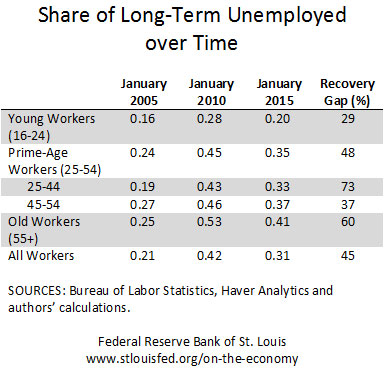Long-Term Unemployment Hit Which Ages Hardest?

The Great Recession led to much longer spells of unemployment for the unemployed. A recent article in The Regional Economist examined this increase in long-term unemployment (LTU), including which groups were affected the most.
Research Officer and Economist Alexander Monge-Naranjo and Technical Research Associate Faisal Sohail examined the changes in the incidence of LTU across different age groups before and after the Great Recession. They found that:
- Among the unemployed, younger and older people were more likely to enter LTU than middle-aged people during the recession.
- Since the recession ended, the LTU rates for older and younger workers have stayed farther above their prerecession rates than have the rates of middle-aged workers.
The authors wrote: “As a result, the pool of the long-term unemployed has become considerably more concentrated in these two age groups.”
Using Current Population Survey data, Monge-Naranjo and Sohail reported the ratio of LTU to total unemployment in the table below for each of the different age categories for three months:
- January 2005, when the unemployment rate was 5.3 percent
- January 2010, when the unemployment rate was 9.8 percent
- January 2015, when the unemployment rate was 5.7 percent

The authors noted that from January 2005 to January 2010, the LTU-to-unemployment ratios were almost twice as high for all age groups. They wrote: “However, the most severely affected were the younger prime and oldest workers, with ratios rounded to 125 percent and 110 percent higher than the 2005 levels.”
All of the groups saw their ratios decline from January 2010 to January 2015, but no ratio fell back to January 2005 levels. Younger prime-age and the oldest workers remained the hardest hit. They remained 73 percent and 60 percent above the 2005 levels, respectively.
Monge-Naranjo and Sohail noted, “The unemployed workers between 25 and 44 who were driven into LTU will bear significant scars for the 20-40 years remaining in their work careers. For the oldest workers, who may not have the skills currently in demand by employers, disaster may be looming because of the combination of much harder times finding a job and the collapse of housing values and retirement funds.”
Additional Resources
- Regional Economist: The Composition of Long-term Unemployment Is Changing toward Older Workers
- On the Economy: Long-Term Unemployment Affected Older Women Most Following Recession
- On the Economy: What We Can Learn from Japan’s Aging Workforce
Citation
ldquoLong-Term Unemployment Hit Which Ages Hardest?,rdquo St. Louis Fed On the Economy, Nov. 26, 2015.
This blog offers commentary, analysis and data from our economists and experts. Views expressed are not necessarily those of the St. Louis Fed or Federal Reserve System.
Email Us
All other blog-related questions

